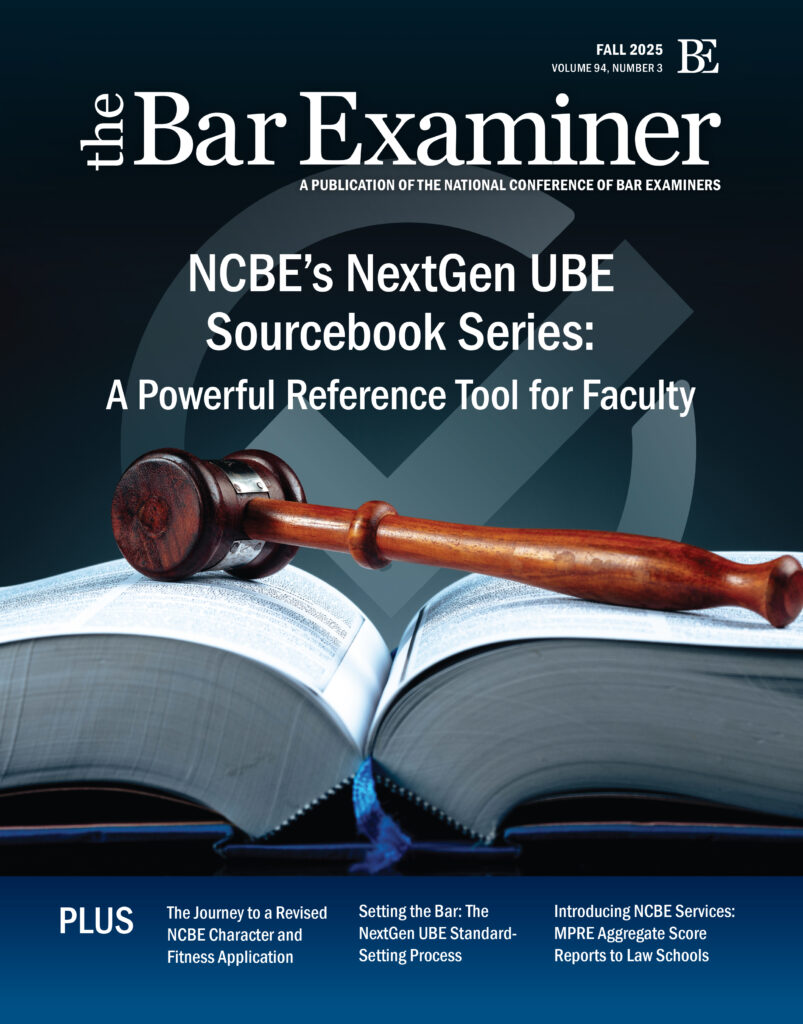This article originally appeared in The Bar Examiner print edition, June 2015 (Vol. 84, No. 2), pp 56–59.
By Fred P. Parker III and Jessica GladBar Admissions
Foreign-educated attorneys—equivalency requirements
In the Matter of Sandhya Tulshyan, 2013 WL 5941633 (WV)
Sandhya Tulshyan was educated at a law school in India. She moved to New York and sought admission to the New York bar, whose rules require that an applicant from a foreign law school complete 20 credit hours in a program at an ABA-approved law school. Tulshyan enrolled in the Masters of Law program at Fordham University and received her degree with 24 credit hours. She then took and passed the bar exam, was admitted in New York, and practiced there from 2006 until 2012, when she moved to West Virginia and sought admission by reciprocity under Rule 4.0.
The West Virginia Board of Law Examiners denied her application for her failure to meet the requirements of Rules 2.0 and 3.0. Tulshyan then requested an administrative hearing. The hearing examiner heard the matter, issued findings and conclusions, and determined that the Board had erroneously concluded that Tulshyan did not meet the requirements in Rules 2.0 and 3.0 since Tulshyan, by passing the New York bar exam, had established equivalency in another manner.
The Board reviewed the report and the transcript of the hearing and voted to deny Tulshyan’s application. Tulshyan filed exceptions, and the matter went to the West Virginia Supreme Court.
The Court stated that the main issue was whether the Board was correct in its conclusion that Rule 3.0(b)(4) applies to all foreign law school graduates. Rule 3.0(b) sets out the policy on equivalency which provides that an applicant who has graduated from a law school approved by the ABA is presumed eligible to take the West Virginia bar exam. The same applies if an applicant has graduated from a non-approved law school, has passed the bar exam in another state, and has been admitted to practice in that state. An applicant who is a graduate of a law school in a foreign country must complete study in an ABA-approved law school with a minimum of 30 credit hours of basic courses.
Rule 4.0 cannot be read in isolation, said the Court. Here, Tulshyan did not satisfy the general requirements for admission because she had not completed the 30 hours of education required to satisfy the West Virginia Rules for Admission. Since Tulshyan graduated from a law school in a foreign country, she had to successfully complete study at an ABA-approved school with a minimum of 30 credit hours in basic courses. She completed only 24 credit hours to be admitted in New York. The Court found that “(t)he standards for admission to practice law in New York at the time of [Tulshyan’s] admission . . . were not substantially equivalent to the requirements for admission . . . in West Virginia.”
The Court concluded that Sandhya Tulshyan was not eligible for admission to practice law in West Virginia without examination.
Bar Examination
Regrading; judicial review
Caranchini v. Missouri Bd. of Law Examiners, 447 S.W.3d 768 (Mo. Ct. App. 2014)
The Missouri Court of Appeals held that the section of the state constitution governing judicial review of administrative action did not provide a right for judicial review of Missouri Board of Bar Examiners’ scoring of and refusal to rescore bar examinations.
Gwendolyn Caranchini was admitted to the Missouri Bar in 1978 and practiced in Missouri until she was disbarred in 1997. Seeking reinstatement, Caranchini took the Missouri bar examination four times but failed each administration based in part on low scores on the essay portion of the exam.
Caranchini subsequently filed suit against the Missouri Board of Bar Examiners challenging her failure to pass the exam under Article V, section 18 of the Missouri constitution, the provision governing judicial review of administrative action. She claimed that the Board had acted arbitrarily and capriciously in developing the essay portion of the examination, in scoring her essay responses, and in failing to provide an opportunity for review and regrading of her responses.
The circuit court dismissed Caranchini’s action on the ground that Missouri law does not provide for judicial review of bar exam scores. Caranchini appealed, arguing that judicial review is required under Article V, section 18.
The Missouri Court of Appeals affirmed the circuit court’s decision, holding that the Board’s action is not subject to review under Article V, section 18. The court explained that Article V, section 18 provides judicial review for claims that an administrative body has made a judicial-type decision unauthorized by law or, when the law requires a hearing, without proper evidence.
“Caranchini has not alleged that the Board was required by law to provide an administrative hearing, so review—if it exists—would be limited to whether the actions complained of are authorized by law,” the court stated. The Board’s actions were plainly authorized by law, the court found, because a court rule and a Board regulation specifically authorize the Board to create, grade, and refuse to regrade an examination.
Furthermore, the court found that the Board is not an “administrative body” as contemplated by Article V, section 18. “Generally, when the law refers to ‘administrative’ entities, the reference is to agencies of the executive branch, not the judiciary. . . . The Governor does not appoint the members of the Board; rather, Board members are appointed by the Missouri Supreme Court, Rule 8.01(a); thus, the Board falls under the umbrella of judicial and not executive power,” the court stated.
Finally, the court noted that the Board is not carrying out a judicial or quasi-judicial function in grading the bar examination. “It does not conduct a hearing, make findings as to any disputed claims, conduct investigations, or do anything else considered ‘judicial’ in nature. Nothing related to merely grading an exam qualifies as ‘functions traditionally viewed as judicial,’” the court stated.
Caranchini’s allegations failed to state a claim upon which relief could be granted, and the Court of Appeals upheld the circuit court’s dismissal of her petition.
Character and Fitness
Failure to disclose on bar application
In the Matter of Natasha M. McDougall, 2013-09465 (NY Appellate Division, Second Department, 2015)
Natasha McDougall graduated from CUNY Law School in 2006 and applied to take the New York bar exam. On her bar application she answered “no” to the question that dealt with being arrested or charged with a crime. In fact she had been arrested for attempting to shoplift from Bloomingdale’s in Manhattan in 1993 when she was 16 years old. She falsely identified herself as “Melissa Rodney,” provided a fictitious address, and was fingerprinted. She thought that if she used a false name, the charges would somehow be dismissed.
When McDougall applied to work as a court attorney in the Brooklyn Family Court, the background check included a fingerprint analysis and the arrest was discovered even though she had used a false name. The Grievance Committee began an investigation and in October 2013 charged McDougall with professional misconduct.
A special referee conducted a hearing. One witness was Judge Jeanette Ruiz, the supervising judge of the Family Court, who testified on McDougall’s behalf. She testified that McDougall had reported to her about the results of the background check, that she had confidence in McDougall’s integrity and honesty, and that she would not fire her.
A panel of the Appellate Division, Second Department, said that in determining the appropriate punishment for McDougall it took into account the “high regard” with which she is held by her peers and by Judge Ruiz; McDougall’s “genuine remorse” was also a factor in the decision to only publicly censure her.
Lack of professionalism; academic determination; judicial deference
Al-Dabagh v. Case Western Reserve Univ., 777 F.3d 355 (6th Cir. 2015)
The U.S. Court of Appeals for the Sixth Circuit held that a university medical school’s decision not to award a diploma to a student for lack of professionalism was a deference-receiving academic judgment even though most of the student’s professional lapses were not linked to his academic performance.
Amir Al-Dabagh enrolled at Case Western Reserve University’s School of Medicine in 2009. Although Al-Dabagh excelled academically, his medical school career was marked by “continued and serious breaches in the code of conduct and standards of professionalism.” He asked his instructor not to mark him late for class, sexually harassed fellow students, jumped out of a moving taxi to avoid paying the fare, gave patient-status presentations on patients he had not actually examined, was thrown out of a patient’s room by the patient’s family, and received consistent complaints from nurses and hospital staff about his demeanor.
Just before he was to be certified for graduation, Al-Dabagh was convicted of driving while intoxicated. The university subsequently decided not to award Al-Dabagh a diploma, citing a lack of professionalism. Al-Dabagh filed suit against the university in federal district court, alleging that it had breached its state-law duties of good faith and fair dealing when it declined to award him a diploma.
The lower court ruled that the determination of “professionalism” went beyond academic or patient-related matters and ordered the university to award Al-Dabagh a medical degree. “The University’s definition of ‘professionalism’ expresses a moral judgment, rather than an evaluation against a set of specialized criteria. . . . Although courts should give almost complete deference to university judgments regarding academic issues, the same deference does not follow university character judgments, especially . . . character judgments only distantly related to medical education.”
On appeal, however, the Sixth Circuit reversed, finding that professionalism is an essential part of what students must learn and practice in medical school. The court noted that Ohio treats the relationship between a university and its students as “contractual in nature.” The terms of the contract, the court found, were supplied by the student handbook and made clear that professionalism was part of the university’s academic curriculum. The court stated:
Case Western’s student handbook . . . makes clear that the only thing standing between Al-Dabagh and a diploma is the [university’s] finding that he lacks professionalism. Unhappily for Al-Dabagh, that is an academic judgment. And we can no more substitute our personal views for the [university’s] when it comes to an academic judgment than the [university] can substitute its views for ours when it comes to a judicial decision.
Moreover, the court rejected Al-Dabagh’s assertion that only professional lapses linked to academic performance were relevant to the university’s professionalism determination. The court explained:
That many professionalism-related cases involve classroom incidents does not establish that only classroom incidents are relevant to the professionalism inquiry, and Al-Dabagh has identified no case holding that the concept must be defined so narrowly. An analogy illustrates the point. Our own standards indicate that professionalism does not end at the courtroom door. E.g., Supreme Court Rules for the Government of the Bar of Ohio, Rule I, § 11(D)(3)(b), (k) (instructing Ohio’s bar admissions committee to consider an applicant’s drug and alcohol problems and his ‘[n]eglect of financial responsibilities’ when assessing his character and fitness). Why should hospitals operate any differently?
The court therefore deferred to Case Western’s determination that Al-Dabagh lacked the professionalism required to practice medicine responsibly and found nothing “arbitrary [or] capricious” about the university’s academic decision not to award Al-Dabagh a diploma.
 Fred P. Parker III is Executive Director Emeritus of the Board of Law Examiners of the State of North Carolina.
Fred P. Parker III is Executive Director Emeritus of the Board of Law Examiners of the State of North Carolina.

Jessica Glad is Staff Attorney for the National Conference of Bar Examiners.
Contact us to request a pdf file of the original article as it appeared in the print edition.







